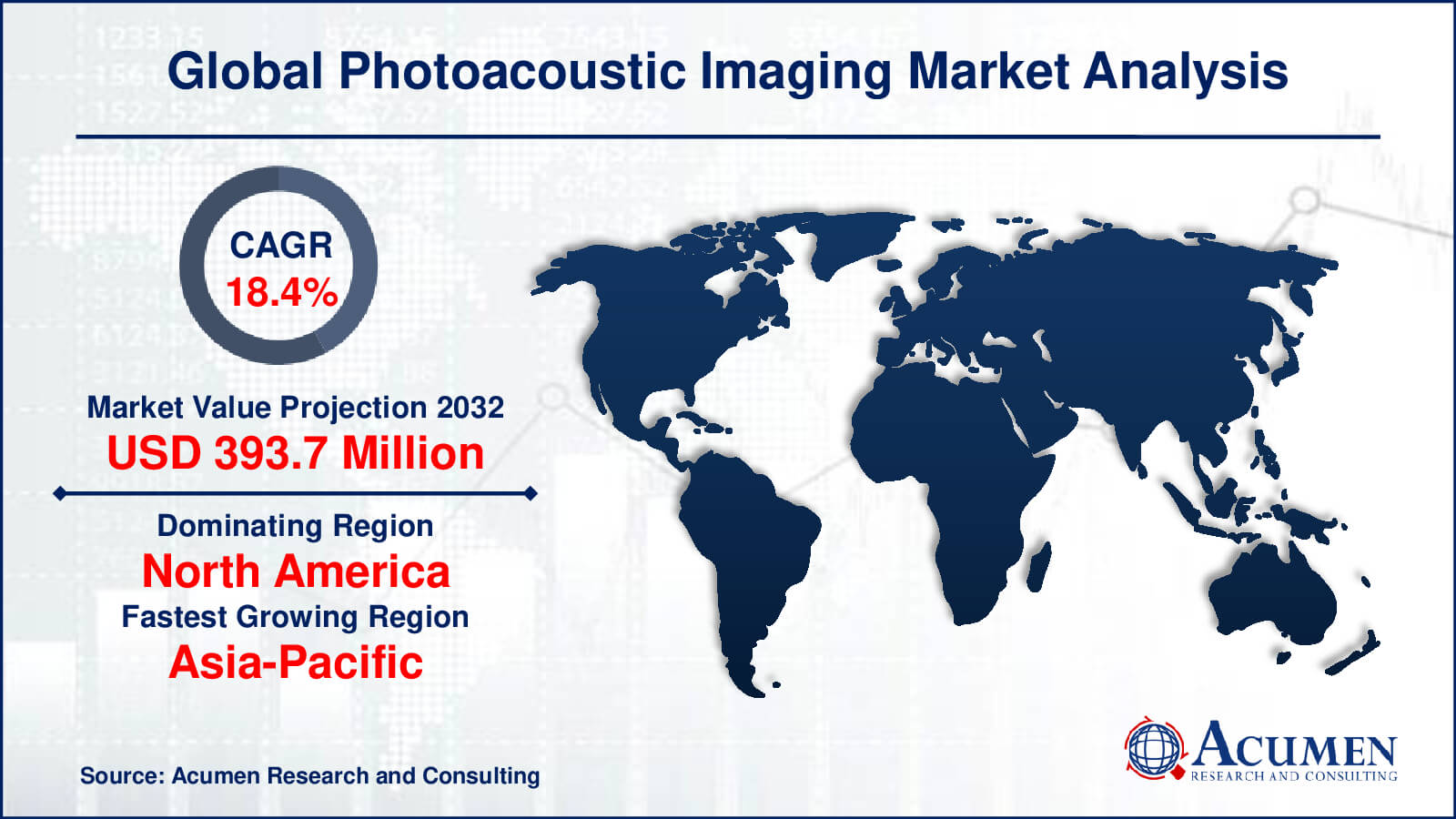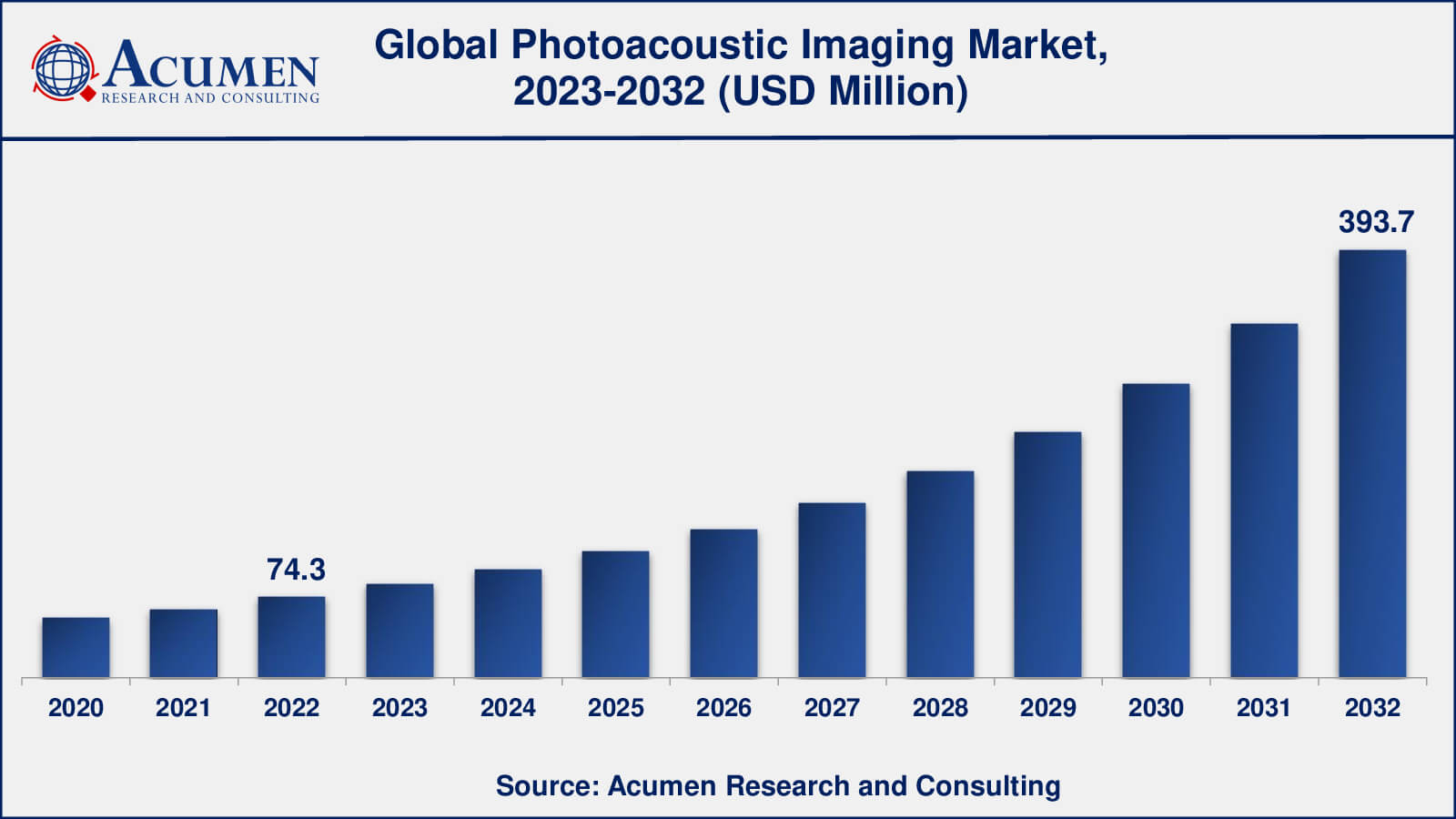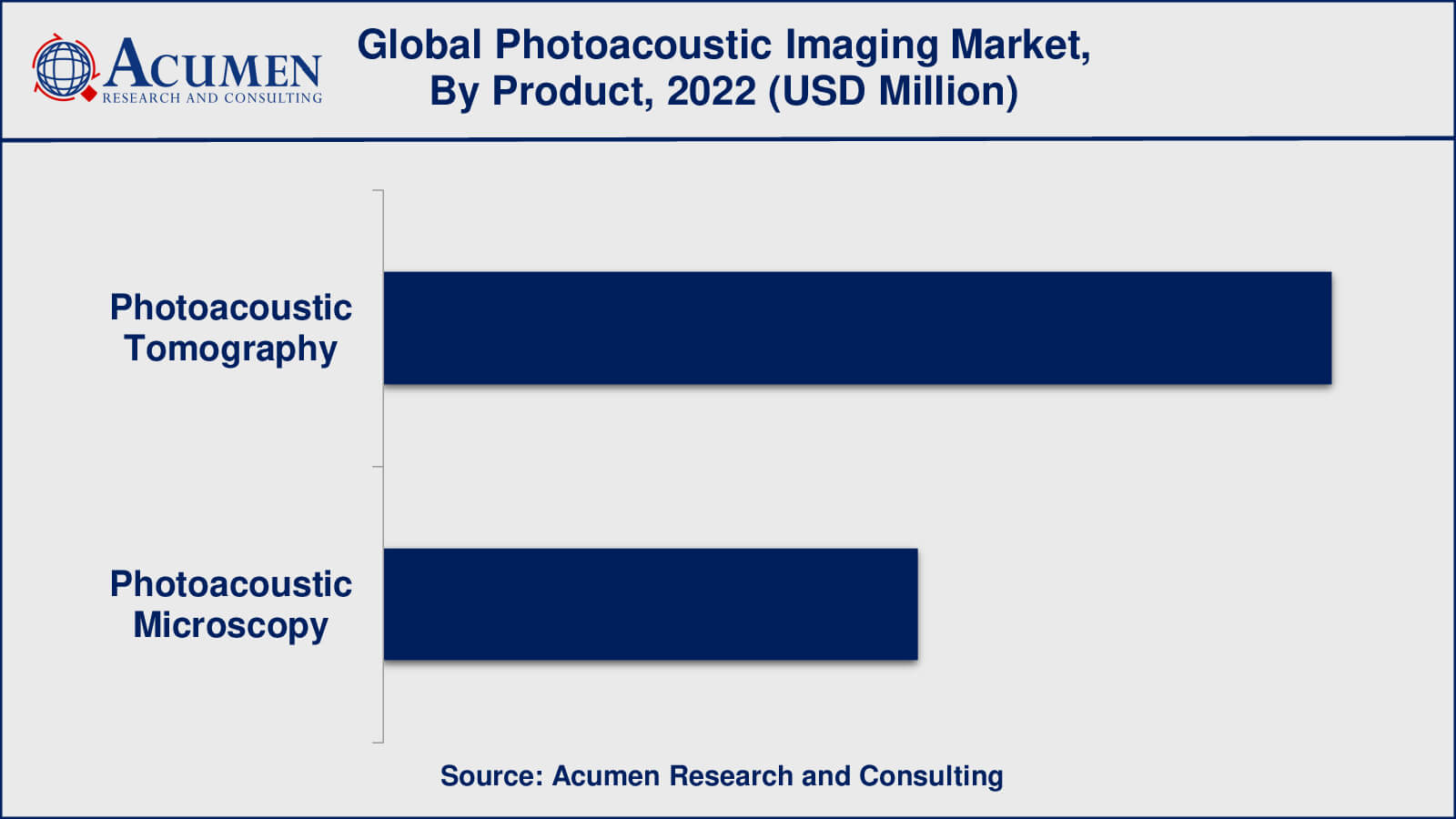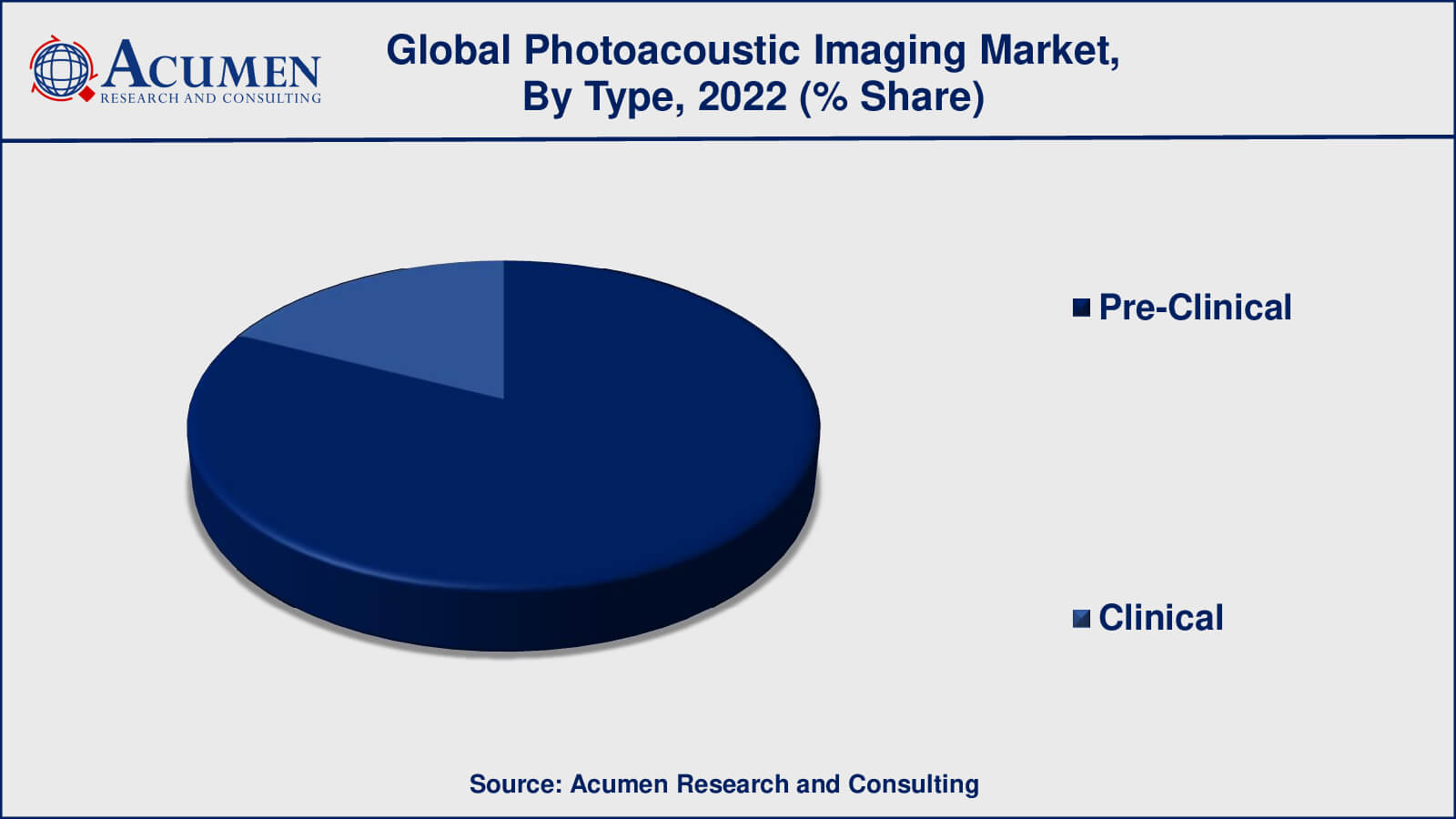Photoacoustic Imaging Market Size - Global Industry, Share, Analysis, Trends and Forecast 2023 - 2032
Published :
Report ID:
Pages :
Format :
Photoacoustic Imaging Market Size - Global Industry, Share, Analysis, Trends and Forecast 2023 - 2032
Report Coverage
- Industry Dynamics
- Market Size and Forecast Data
- Segment Analysis
- Competitive Landscape
- Regional Analysis with a Niche Focus on Country-Level Data
- High Level Analysis - Porter's, PESTEL, Value Chain, etc.
- Company Profiles of Key Players
- Option to Customize the Report As Per Your Specific Need
Request Sample Report
The Global Photoacoustic Imaging Market Size accounted for USD 74.3 Million in 2022 and is estimated to achieve a market size of USD 393.7 Million by 2032 growing at a CAGR of 18.4% from 2023 to 2032.
Photoacoustic Imaging Market Highlights
- Global photoacoustic imaging market revenue is poised to garner USD 393.7 Million by 2032 with a CAGR of 18.4% from 2023 to 2032
- North America photoacoustic imaging market value occupied around 31.9 million in 2022
- Asia-Pacific photoacoustic imaging market growth will record a CAGR of more than 19% from 2023 to 2032
- Among product, the photoacoustic tomography (PAT) sub-segment generated over US$ 47.6 million revenue in 2022
- Based on type, the pre-clinical sub-segment generated around 82% share in 2022
- Growing research and expanding clinical applications of photoacoustic imaging is a popular market trend that fuels the industry demand

Photoacoustic imaging is a cutting-edge medical imaging approach that combines the principles of ultrasound with the photoacoustic effect caused by a laser. The absorption of laser pulses by tissues generates acoustic waves, which are subsequently measured using ultrasonic transducers. This imaging modality provides great resolution and deep penetration for the visualization of tissue architecture and functional information.
Photoacoustic imaging is employed in a variety of medical applications, such as cancer diagnosis and characterization, cardiovascular imaging, neuroimaging, and oxygenation and blood flow monitoring. Its capacity to give anatomical as well as functional information makes it particularly useful for investigating disease processes and directing therapies.
In terms of commercial performance, photoacoustic imaging is a promising developing technology. While it is still being explored and developed, it has attracted considerable interest and investment from both academics and business. Numerous investigations and clinical trials have shown that it has the ability to improve diagnosis accuracy and guide therapy methods. It should be noted, however, that broad use and commercial availability of photoacoustic imaging systems may still need significant technological improvements, standardization, and regulatory clearances. Nonetheless, photoacoustic imaging's future prospects are promising, and it has the potential to become an essential tool in the field of medical imaging.

Global Photoacoustic Imaging Market Dynamics
Market Drivers
- Growing demand for high sensitivity and resolution imaging
- Increasing preference for non-invasive and safe diagnostic techniques
- Rising recognition of the importance of functional imaging in disease diagnosis
- Potential for early detection of diseases, driving research and development efforts
Market Restraints
- Limited commercial availability of photoacoustic imaging systems
- Complexity and high cost of equipment hindering widespread adoption
- Lack of standardization in photoacoustic imaging techniques and protocols
- Depth limitations affecting imaging of deep-seated tissues and organs
Market Opportunities
- Advancements in photoacoustic imaging technology and techniques
- Integration of photoacoustic imaging with existing imaging systems for enhanced diagnostic capabilities
- Increasing interest in theranostic applications of photoacoustic imaging
- Rising healthcare demands driving the need for advanced imaging modalities
Photoacoustic Imaging Market Report Coverage
| Market | Photoacoustic Imaging Market |
| Photoacoustic Imaging Market Size 2022 | USD 74.3 Million |
| Photoacoustic Imaging Market Forecast 2032 | USD 393.7 Million |
| Photoacoustic Imaging Market CAGR During 2023 - 2032 | 18.4% |
| Photoacoustic Imaging Market Analysis Period | 2020 - 2032 |
| Photoacoustic Imaging Market Base Year | 2022 |
| Photoacoustic Imaging Market Forecast Data | 2023 - 2032 |
| Segments Covered | By Type, By Product, By Application, And By Geography |
| Regional Scope | North America, Europe, Asia Pacific, Latin America, and Middle East & Africa |
| Key Companies Profiled | Advantest Corp., Aspectus GmbH, Endra Life Sciences Inc., FUJIFILM VisualSonics Inc., iThera Medical GmbH, Kibero GmbH, PhotoSound Technologies Inc., Optosonics Ltd., Seno Medical Instruments, TomoWave, and Vibronix Inc. |
| Report Coverage |
Market Trends, Drivers, Restraints, Competitive Analysis, Player Profiling, Covid-19 Analysis, Regulation Analysis |
Photoacoustic Imaging Market Insights
Photoacoustic imaging is undergoing volatile market dynamics due to a variety of variables. The great sensitivity and resolution of the technology are major drivers, since they allow for thorough visualization of tissue architecture and functional information. This potential has piqued the curiosity of many in the medical world, notably in cancer diagnosis and characterization, cardiovascular imaging, and neuroimaging. Photoacoustic imaging's non-invasive and safe nature adds to its appeal, since it avoids the hazards associated with ionizing radiation exposure present in other imaging modalities such as CT or PET
Another major driver is photoacoustic imaging's multimodal capabilities. Healthcare practitioners can acquire complete and complementary information for more accurate diagnosis and treatment plans by integrating it with other imaging modalities such as ultrasound, MRI, or fluorescence imaging. Photoacoustic imaging's functional imaging features, such as the capacity to monitor tissue oxygenation, blood flow, and biomarkers, provide vital insights into disease processes and treatment responses, making it a viable tool in personalized medicine.
Despite its promise, the photoacoustic imaging sector has certain challenges. Because the technology is still in its early stages, commercial availability remains a hurdle. Equipment complexity and expense are two further constraints that may stymie wider adoption, particularly in resource-constrained environments. Standardization of imaging methods and parameters is also required to achieve consistent and trustworthy findings across various imaging systems and circumstances. Furthermore, while photoacoustic imaging has better depth penetration than optical imaging approaches, it may have difficulty visualizing deeper structures or organs due to acoustic attenuation.
However, there are various prospects for the photoacoustic imaging industry to grow and expand. Improvements in laser technology, ultrasonic transducers, and picture reconstruction algorithms, for example, can increase the performance and capabilities of photoacoustic imaging systems. Ongoing research and clinical applications investigating the possibilities of this imaging modality in numerous medical domains help to increase its acceptance and clinical utility.
The incorporation of photoacoustic imaging capabilities into current imaging platforms, such as ultrasound systems, opens the door to increased adoption and diagnostic capabilities. Photoacoustic imaging paired with targeted treatments or theranostic drugs holds potential for image-guided interventions and personalized medicine.
Finally, expanding healthcare needs, such as the increased prevalence of illnesses such as cancer and cardiovascular ailments, generate an increasing demand for better imaging technology. With its potential for early detection, precise diagnosis, and therapy monitoring, photoacoustic imaging can meet these needs and enhance patient outcomes. As a consequence, the photoacoustic imaging industry is primed for expansion and will gain traction in the coming years.
Photoacoustic Imaging Market Segmentation
The worldwide market for photoacoustic imaging is split based on product, type, application, and geography.
Photoacoustic Imaging Products
- Photoacoustic Tomography (PAT)
- Photoacoustic Microscopy (PAM)

According to photoacoustic imaging industry analysis, photoacoustic tomography has dominated the photoacoustic imaging market. PAT is a technology that combines photoacoustic imaging with computed tomography (CT) or ultrasonic imaging. It generates three-dimensional pictures of tissues and organs, providing a detailed perspective of anatomical features, functional information, and blood flow. PAT has been used in a variety of domains, including cancer imaging, neuroimaging, cardiovascular imaging, and preclinical research.
Photoacoustic microscopy (PAM) is concerned with high-resolution imaging at the microscopic level. It visualises structural and cellular features with high spatial resolution using laser-induced ultrasound. PAM imaging of cellular morphology, vasculature, and functional dynamics at the cellular level has been widely employed in biological and preclinical research.
Photoacoustic Imaging Types
- Pre-Clinical
- Clinical

The preclinical segment is critical in advancing photoacoustic imaging technology innovation, research, and development. Preclinical investigations in laboratory settings, employing animal models or ex vivo tissue samples, have made major contributions to improving knowledge of photoacoustic imaging principles, optimising imaging parameters, and exploring novel applications.
Preclinical research allows scientists and researchers to examine the feasibility and usefulness of photoacoustic imaging in a variety of domains, including cancer research, neurology, cardiovascular investigations, and medication development. It enables imaging technique validation, imaging probe creation, and evaluation of novel imaging algorithms. The preclinical phase provides a significant platform for studying and developing the possibilities of photoacoustic imaging in new applications.
While the clinical component is critical in introducing photoacoustic imaging into patient care, the importance of the preclinical part should not be underestimated. It serves as the foundation for technological developments, contributes to scientific publications, and directs the development of new imaging technologies and applications. Both preclinical and clinical divisions are critical components of the photoacoustic imaging market, each playing a unique role in driving the industry's growth and applications.
Photoacoustic Imaging Applications
- Angiology
- Oncology
- Cardiology
- Neurology
- Histology
- Interventional Radiology
According to photoacoustic imaging market forecast, Oncology is one of the application segments that has received substantial attention in the photoacoustic imaging field. Photoacoustic imaging has demonstrated potential in cancer diagnosis, characterisation, and treatment response monitoring. Because of its capacity to give both anatomical and functional information, such as tumour angiogenesis, oxygenation, and metabolism, it has proven useful in oncological research and therapeutic applications.
Another application sector where photoacoustic imaging has tremendous promise is cardiology. It can offer data on cardiac structure, blood flow, and oxygenation, which can help in the diagnosis of cardiovascular disorders such as ischemic heart disease, heart failure, and vascular anomalies.
Neurology, particularly brain imaging and neuroscience research, is an expanding application area for photoacoustic imaging. The capacity of photoacoustic imaging to visualise cerebral vasculature, detect oxygenation changes, and map functional activity offers great promise for understanding brain illnesses, investigating brain function, and directing neurosurgical procedures.
While not precisely an application sector in the usual sense, histology is an area where photoacoustic imaging has shown promise. Researchers have investigated the use of photoacoustic imaging in imaging cellular and subcellular components, yielding useful insights into tissue composition and histopathology by integrating it with microscopy methods.
Photoacoustic Imaging Market Regional Outlook
North America
- U.S.
- Canada
Europe
- U.K.
- Germany
- France
- Spain
- Rest of Europe
Asia-Pacific
- India
- Japan
- China
- Australia
- South Korea
- Rest of Asia-Pacific
Latin America
- Brazil
- Mexico
- Rest of Latin America
The Middle East & Africa
- South Africa
- GCC Countries
- Rest of the Middle East & Africa (ME&A)
Photoacoustic Imaging Market Regional Analysis
North America has always been a major market for medical imaging technologies such as photoacoustic imaging. Several significant firms active in the development and marketing of photoacoustic imaging devices are based in the region. Factors such as solid healthcare infrastructure, considerable R&D activity, and major expenditures in healthcare technology all contribute to photoacoustic imaging adoption in North America.
Another important market for photoacoustic imaging is Europe, with numerous nations actively interested in research and therapeutic applications. The region benefits from excellent academic institutions, research collaborations, and regulatory frameworks that are favorable. Europe has made important contributions to the advancement of photoacoustic imaging technology, including clinical trials and research investigations in a variety of application areas.
Asia-Pacific (APAC) has significant development potential in the photoacoustic imaging industry. Rapidly developing healthcare infrastructure, rising healthcare costs, and a growing emphasis on innovative medical technology all contribute to the region's adoption of photoacoustic imaging. Countries such as China, Japan, and South Korea have been at the forefront of APAC R&D activities, propelling market expansion.
Photoacoustic Imaging Market Players
Some of the top photoacoustic imaging companies offered in our report includes Advantest Corp., Aspectus GmbH, Endra Life Sciences Inc., FUJIFILM VisualSonics Inc., iThera Medical GmbH, Kibero GmbH, PhotoSound Technologies Inc., Optosonics Ltd., Seno Medical Instruments, TomoWave, and Vibronix Inc.
In April 2021, MSOTinventis, a new version of iThera Medical's multispectral optoacoustic tomography (MSOT) imaging technology, was launched. MSOTinventis provides researchers with high-resolution functional and molecular information in preclinical and translational studies through increased imaging capabilities, quicker scan times, and an improved user experience.
In March 2021, Seno Medical revealed favorable clinical trial findings for their Imagio® breast imaging system, which combines photoacoustic imaging and ultrasound. The study revealed the system's capacity to distinguish between malignant and benign breast masses, suggesting that it might provide a non-invasive and radiation-free imaging option for breast cancer detection.
Frequently Asked Questions
What was the market size of the global photoacoustic imaging in 2022?
The market size of photoacoustic imaging was USD 74.3 million in 2022.
What is the CAGR of the global photoacoustic imaging market from 2023 to 2032?
The CAGR of photoacoustic imaging is 18.4% during the analysis period of 2023 to 2032.
Which are the key players in the photoacoustic imaging market?
The key players operating in the global market are including Advantest Corp., Aspectus GmbH, Endra Life Sciences Inc., FUJIFILM VisualSonics Inc., iThera Medical GmbH, Kibero GmbH, PhotoSound Technologies Inc., Optosonics Ltd., Seno Medical Instruments, TomoWave, and Vibronix Inc.
Which region dominated the global photoacoustic imaging market share?
North America held the dominating position in photoacoustic imaging industry during the analysis period of 2023 to 2032.
Which region registered fastest CAGR from 2023 to 2032?
Asia-Pacific region exhibited fastest growing CAGR for market of photoacoustic imaging during the analysis period of 2023 to 2032.
What are the current trends and dynamics in the global photoacoustic imaging industry?
The current trends and dynamics in the photoacoustic imaging industry include growing demand for high sensitivity and resolution imaging, increasing preference for non-invasive and safe diagnostic techniques, and rising interest in multimodal imaging capabilities.
Which product held the maximum share in 2022?
The photoacoustic tomography product held the maximum share of the photoacoustic imaging industry.?



